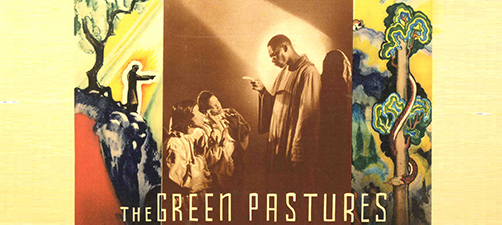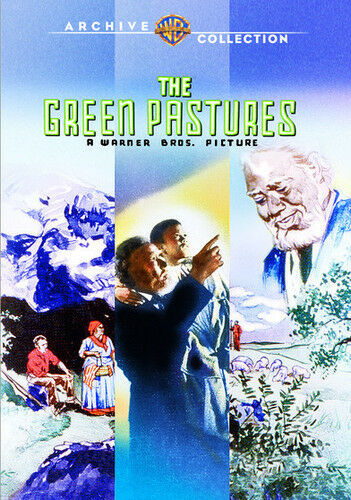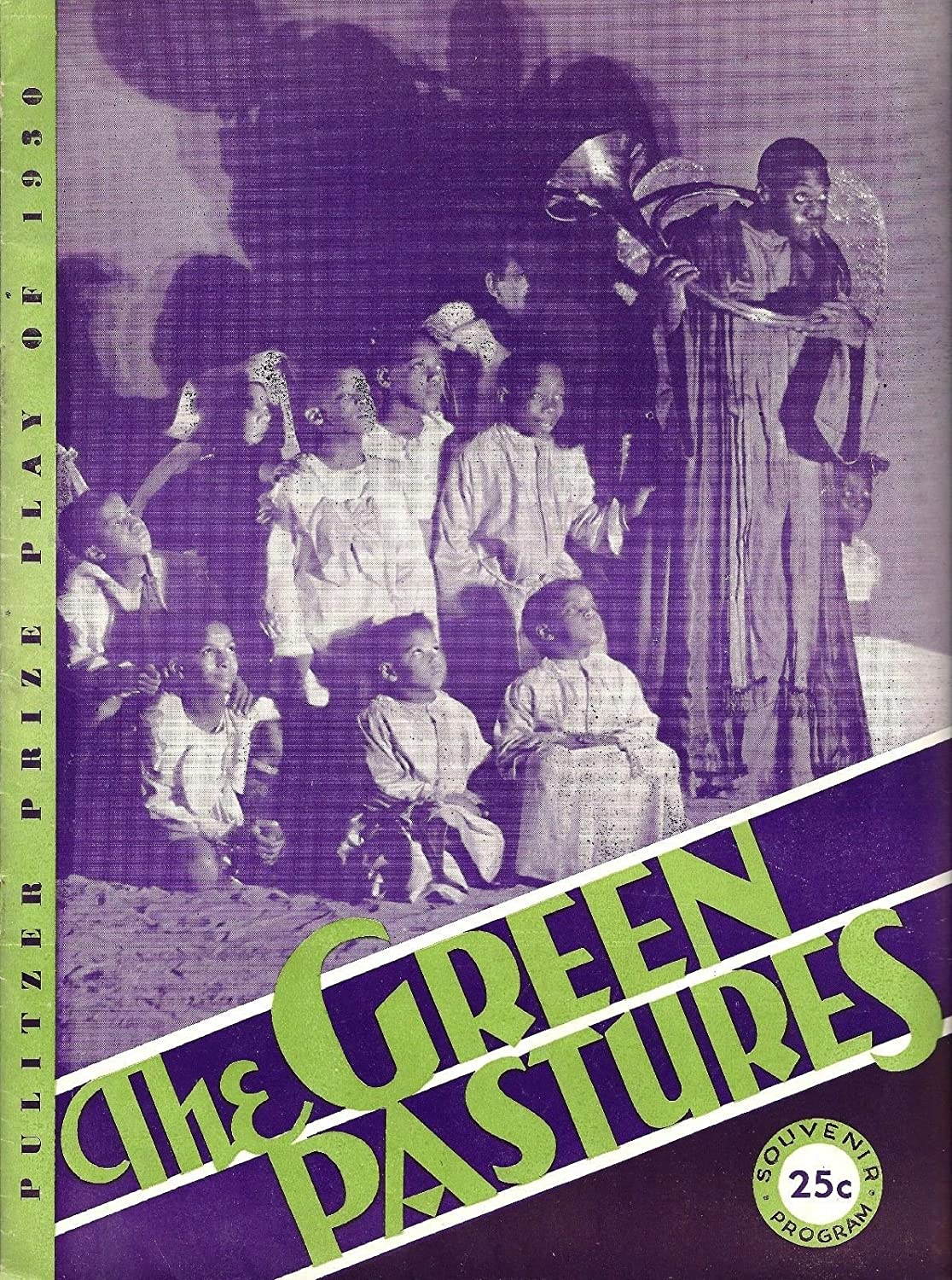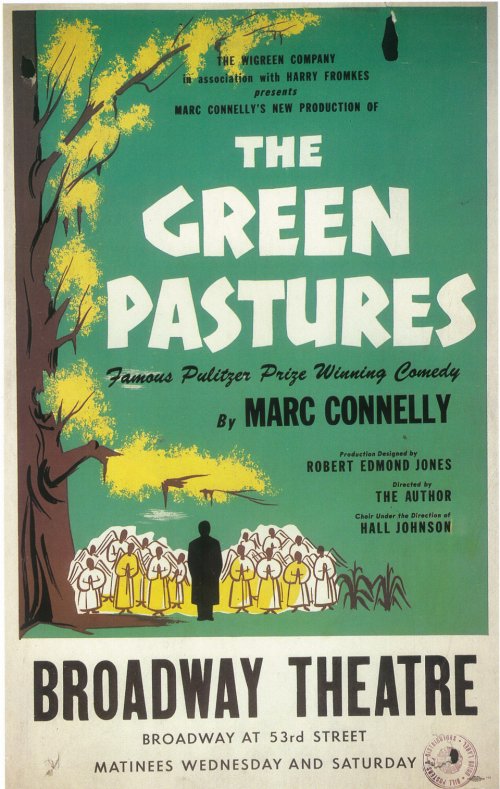
The Green Pastures is a play with music written in 1930 by Marc Connelly adapted from Ol' Man Adam an' His Chillun (1928), a collection of stories written by Roark Bradford. The play was the winner of the Pulitzer Prize for Drama in 1930. It had the first all-black Broadway cast.

Version 3
Green Pastures (The) (1936-07-Film)
Type de série: FilmThéâtre: *** Film (*** - ***)
Durée :
Nombre :
Première Preview : jeudi 16 juillet 1936
Première : jeudi 16 juillet 1936
Dernière : Inconnu
Mise en scène : Marc Connelly • William Keighley •
Chorégraphie :
Producteur :
Avec : Rex Ingram (De Lawd / Adam / Hezdrel), Oscar Polk (Gabriel), Eddie "Rochester" Anderson (Noah), Frank Wilson (Moses), George H. Reed (Mr. Deshee / Aaron), Abraham Gleaves (Archangel), Myrtle Anderson (Eve), Al Stokes (Cain), Edna Mae Harris (Zeba), James Fuller (Cain the Sixth), George Randol (High Priest), Ida Forsyne (Noah's Wife), Ray Martin (Shem), Charles Andrews (Flatfoot), Dudley Dickerson (Ham), Jimmy Burress (Japheth), Billy Cumby (Abraham / Head Magician / King of Babylon), Ivory Williams (Jacob), David Bethea (Aaron), Ernest Whitman (Pharaoh), Reginald Fenderson (Joshua), Slim Thompson (Master of Ceremonies), Clinton Rosemond (Prophet), Hall Johnson Choir (Vocal Ensemble)
The play portrays episodes from the Old Testament as seen through the eyes of a young African-American child in the Great Depression-era Southern United States, who interprets The Bible in terms familiar to her. Following Bradford's lead, Connelly (a white man) set the biblical stories in New Orleans and in an all-black context. He diverged from Bradford's work, however, in enlarging the role of the character "De Lawd" (God), played on stage by Richard B. Harrison (1864–1935). The Green Pastures also featured numerous African-American spirituals arranged by Hall Johnson and performed by The Hall Johnson Choir. The cast also included singer Mabel Ridley.The chorus included torch singer Eva Sylvester and members of the Sylvester family as cherubs.
The musical numbers were for the most part based on traditional spirituals and gospel songs, but also included original music by Hall Johnson.
From today’s vantage point, the idea of two white men (Bradford and Connelly) presuming to depict biblical stories from the black point of view (and in dialect, no less) seems condescending and patronizing (God and His angels attend a fish fry; Babylon is a Harlem nightclub; Gabriel passes out cigars). But there’s no evidence of racism in what was clearly their honest wish to give voice to what they truly believed was part of the black religious experience. The evening included various traditional spirituals and gospel songs performed by a choir under Hall Johnson’s musical direction, and Johnson himself contributed two new songs (most of the musical sequences were sung between scene changes). The work was the first of many later Broadway and Off-Broadway lyric works that took the gospel and/or gospel music as inspiration, shows such as God’s Trombones (and its later variant, Trumpets of the Lord), Black Nativity, Godspell, Your Arms Too Short to Box with God, The Gospel at Colonus, and Sing Hallelujah!
Connolly later collaborated with William Keighley in the direction of a Hollywood film adaptation of the play, which was made in 1936, starring Rex Ingram as "De Lawd". At the time the film caused some controversy. It was banned in Australia, Finland, and Hungary on the grounds that it was "blasphemous" to portray Biblical characters in this way.
The play was adapted for television, and presented twice during the days of live TV on the Hallmark Hall of Fame in 1957 and 1959. Both productions starred William Warfield as "De Lawd", in the largest dramatic acting role he ever had on television.
Aucun dossier informatif complémentaire concernant Green Pastures (The)

Version 1
Green Pastures (The) (1930-02-Mansfield Theatre-Broadway)
Type de série: OriginalThéâtre: Brooks Atkinson Theatre (Broadway - Etats-Unis)
Durée : 1 an 6 mois
Nombre : 640 représentations
Première Preview : mercredi 26 février 1930
Première : mercredi 26 février 1930
Dernière : samedi 29 août 1931
Mise en scène : Marc Connelly •
Chorégraphie :
Producteur :
Avec : Charles H. Moore (Mr. Deshee), Alicia Escamilla (Myrtle), Jazzlips Richardson Jr. (First Boy), Howard Washington (Second Boy), Reginald Blythwood (Third Boy), Joe Byrd (Randolph), Frances Smith (A Cook), (J.) Homer Tutt (Custard Maker, Ham, High Priest), Anna Mae Fritz (First Mammy Angel, Second Woman), Josephine Byrd (A Stout Angel, Voice in Shanty, First Cleaner), Edna Thrower (A Slender Angel), J. A. Shipp (Archangel, Abraham), Wesley Hill (Gabriel), Richard B. Harrison (The Lord), McKinley Reeves (Choir Leader, Aaron), Daniel L. Haynes (Adam), Inez Richardson Wilson (Eve), Lou Vernon (Cain), Dorothy Randolph (Cain’s Girl), Edna M. Harris (Zeba), James Fuller (Cain the Sixth), Louis Kelsey (Boy Gambler), Collington Hayes (First Gambler), Ivan Sharp (Second Gambler, First Scout, Prophet), Tutt Whitney (Noah), Susie Sutton (Noah’s Wife), Milton J. Williams (Shem), Dinks Thomas (First Woman), Geneva Blythwood (Third Woman), Emory S. Richardson (First Man, First Wizard, Officer), Freddie Archibald (Flatfoot), Stanleigh Morrell (Japheth, Joshua, Another Officer), Florence Fields (Second Cleaner), Charles H. Moore (Isaac), Edgar Burks (Jacob), Alonzo Fenderson (Moses), Mercedes Gilbert (Zipporah), Reginald Fenderson (A Candidate Magician), George Randol (Pharaoh), Walt McClane (The General), Arthur Porter (Head Magician), Billy Cumby (Master of Ceremonies), Jay Mondaaye (King of Babylon); The King’s Favorites: Leona Winkler, Florence Lee, Constance Van Dyke, Mary Ella Hart, and Inez Persand; Daniel L. Haynes (Hezdrel); The Children: Philistine Bumgardner, Margery Bumgardner, Fredia Longshaw, Wilbur Cohen Jr., Verdon Perdue, Ruby Davis, Willmay Davis, Margerette Thrower, and Viola Lewis; Angels and Townspeople: Amy Escamilla, Elsie Byrd, Benveneta Washington, Thula Oritz, Ruth Carl, and Geneva Blythwood; Babylonian Band: Carl Shorter, Earl Bowie, Thomas Russell, and Richard Henderson; The Choir: Evelyn Burwell (Assistant Choir Director); Sopranos—Bertha Wright, Geraldine Gooding, Marie Warren, Mattie Harris, Elsie Thompson, Massie Patterson, and Marguerite Avery; Altos—Ruthena Matson, Leona Avery, Mrs. Willie Mays, Viola Mickens, and Charlotte Junius; Tenors—John Warner, Joe Loomis, Walter Hilliard, Harold Foster, Adolph Henderson, William McFarland, McKinley Reeves, and Arthur Porter; Baritones—Marc D’Albert, Gerome Addison, Walter Whitfield, and D. K. Williams; Bassos—Lester Holland, Cecil T. McNair, Tom Lee, Walter Meadows, and Frank Horace

Version 2
Green Pastures (The) (1935-04-44th Street Theatre-Broadway)
Type de série: RevivalThéâtre: 44th Street Theatre (Broadway - Etats-Unis)
Durée : 1 mois 4 semaines
Nombre : 71 représentations
Première Preview : mardi 26 février 1935
Première : mardi 26 février 1935
Dernière : samedi 27 avril 1935
Mise en scène : Marc Connelly •
Chorégraphie :
Producteur :
Avec : Charles H. Moore (Mr. Deshee), Alice Snyder (Myrtle), Charles Hill (Carlisle), Wilbur Cohen Jr. (Second Boy), Roland Jones (Third Boy), Lloyd Warren (Randolph), Irene Watts (A Cook), Randall Homer (Custard Maker), Anna Mae Fritz (First Mammy Angel), Laura Anderson (A Stout Angel), Leonora Winkler (A Slender Angel), Allen Charles (Archangel), Oscar Polk (Gabriel), Richard B. Harrison (The Lawd), Roy McKinley (Choir Leader), Daniel L. Haynes (Adam), Geraldine Gooding (Eve), Thomas Russell (Cain), Benveneta Washington (Cain’s Girl), Edna M. Harris (Zeba), James Fuller (Cain the Sixth), Jazzlips Richardson Jr. (Boy Gambler), Richard Emory (First Gambler), Harold Hines (Second Gambler), Mary Frances (Voice in Shanty), Morris McKinney (Noah), Susie Sutton (Noah’s Wife), Milton J. Williams (Shem), Harriet Hoyt (First Woman), Janet Stevens (Second Woman), Alice Geneva (Third Woman), Mildred Allison (Fourth Woman), Henry Blake (First Man), Freddie Archibald (Flatfoot), J. Homer Tutt (Ham), Harry Thompson (Japhet), Florence Fields (First Cleaner), Frances Smith (Second Cleaner); Charles Winter Wood (Abraham), John Charles (Isaac), William McFarland (Moses), Mercedes Gilbert (Zipporah), McKinley Reeves (Aaron), Reginald Fenderson (A Candidate Magician), George Randol (Pharoah), Charles Winter (The General), James Lindsay (The Admiral), George Milton (First Wizard), Carl Shorter (Second Wizard), Arthur Porter (Head Magician), George Brown (Outer Guard), D. Jay Sidney (Joshua), Charles Ivan (First Scout), Billy Cumby (Master of Ceremonies), William Fenton (King of Babylon), Ivan Sharp (Prophet), J. Homer (High Priest); The King’s Favorites: Leonora Winkler, Nonie Simmons, Viola Mickens, Florence Lee, and Constance Van Dyke; Emory Richardson (Officer), Daniel L. Haynes (Hezdrel), James Morrison (Another Officer); The Children: Marie Benton, Beatrice Davis, Ruby Davis, Alice Cottingham, Theon Lewis, Alice Snyder, Lloyd Warren, Rudolph Williams, Ashley Webb, Roland Jones, Charles Hill, George Carroll, Booker T. Washington Jr., Wilbur Cohen Jr.; Angels and Townspeople: Ruth Carl, Willis Norton, Franklyn Brown, Anna Washington, Earl Gough; Babylonian Band: Carl Shorter, Richard Henderson, Thomas Russell, Edgar Yancey; The Choir: Evelyn Burwell (Director), Oliver Foster (Assistant Director); Sopranos—Bertha Wright, Geraldine Gooding, Almalillie Hubbard, Neil Hunter, Mattie Harris, Gertrude DeVerney, Marie Warren, Mabel Ridley, Massie Patterson; Altos—Olive Ball, Willie Mays, Viola Mickens, Benveneta Washington, Myrtle Anderson; Tenors—Robert P. Ecton, Arthur Porter, James Taylor Jr., McKinley Reeves, William McFarland, Augustus Simons, Carrington Lewis; Baritones—T. Lloyd Hickman, Jerome Addison, Benjamin Ragsdale, Walter Whitfield; Bassos—Walter Meadows, Frank Horace, J. E. Lightfoot
Commentaires : The revival of Marc Connelly’s The Green Pastures opened five years to the day of the work’s Broadway premiere on February 26, 1930. During the interim, the self-described “fable” had played on Broadway for 640 performances, won the Pulitzer Prize for drama, and had toured nonstop throughout the United States (in a cover story about the work and its current revival, Time reported the play with music had given 1,652 performances in 203 U.S. cities and one Canadian province for a total gross of $3 million).
Sadly, a few days after the revival’s premiere Harrison died of heart failure before the March 14 performance. For the remainder of the run, his understudy Charles Winter Wood played the role of The Lawd.

Version 3
Green Pastures (The) (1936-07-Film)
Type de série: FilmThéâtre: *** Film (*** - ***)
Durée :
Nombre :
Première Preview : jeudi 16 juillet 1936
Première : jeudi 16 juillet 1936
Dernière : Inconnu
Mise en scène : Marc Connelly • William Keighley •
Chorégraphie :
Producteur :
Avec : Rex Ingram (De Lawd / Adam / Hezdrel), Oscar Polk (Gabriel), Eddie "Rochester" Anderson (Noah), Frank Wilson (Moses), George H. Reed (Mr. Deshee / Aaron), Abraham Gleaves (Archangel), Myrtle Anderson (Eve), Al Stokes (Cain), Edna Mae Harris (Zeba), James Fuller (Cain the Sixth), George Randol (High Priest), Ida Forsyne (Noah's Wife), Ray Martin (Shem), Charles Andrews (Flatfoot), Dudley Dickerson (Ham), Jimmy Burress (Japheth), Billy Cumby (Abraham / Head Magician / King of Babylon), Ivory Williams (Jacob), David Bethea (Aaron), Ernest Whitman (Pharaoh), Reginald Fenderson (Joshua), Slim Thompson (Master of Ceremonies), Clinton Rosemond (Prophet), Hall Johnson Choir (Vocal Ensemble)

Version 4
Green Pastures (The) (1951-03-Broadway Theatre-Broadway)
Type de série: RevivalThéâtre: Broadway Theatre (Broadway - Etats-Unis)
Durée : 1 mois 1 semaine
Nombre : 44 représentations
Première Preview : jeudi 15 mars 1951
Première : jeudi 15 mars 1951
Dernière : samedi 21 avril 1951
Mise en scène : Marc Connelly •
Chorégraphie :
Producteur :
Avec : John Marriott (Mr. Deshee, Moses), Joyce Gissentanner (Myrtle), Philip Hepburn (First Boy, Boy Gambler), Pierre Dillard (Second Boy), Ernest Bloomfield (Randolph), Philip Brinson (Carlisle), William Veasey (First Cook, Aaron, Prophet), William McDaniel (A Voice), Alma L. Hubbard (Second Cook, Noah’s Wife), Avon Long (First Man Angel, Ham, Head Magician, The King of Babylon), Ethel Purnello (First Mammy Angel), Anna Mae Richardson (A Stout Angel, Voice in Shanty, Second Woman, Second Cleaner), Margaret Williams (A Slender Angel, First Cleaner), William O. Davis (Archangel, First Wizard), Courtenaye Olden (Teacher Angel, A Concubine), Ossie Davis (Gabriel), William Marshall (God), Rodger Alford (Choir Leader, A Candidate’s Magician, Scout), James Fuller (Custard Maker, Gambler, Japheth), William Dillard (Adam, Hezdrel), Milroy Ingram (Eve, First Woman, Zipporah), Van Prince (Cain, Cain the Sixth, Joshua), Vinie Burrows (Zeba), George Hill (Gambler), John Rainey (Gambler), George Royston (Gambler), Robert McFerrin (Gambler, Shem, Isaac, Second Officer), Alonzo Bosan (Noah, Abraham), Tina Marshall (Third Woman, A Manicurist, Guest of High Priest), John Bouie (First Man, Jacob, Pharaoh, High Priest), Randolph Sawyer (Flatfoot, Master of Ceremonies), George O. Willis (A General, Scout), Calvin Dash (Scout, Corporal); The King of Babylon’s Favorites: Hope Foye, Yvonne Jiggets, Jumel Jones, Milroy Ingram, Courtenaye Olden; The Children: Patricia Bloomfield, Beatrice Edwards, Joyce Gissentanner, Dierdre Greenway, Marcia Titus, Mary Young, Ernest Bloomfield, Eugene Bloomfield, Philip Brinson, Jimmie Burton, Pierre Dillard, Philip Hepburn, Robert Titus; The Choir: Director: Hall Johnson; Assistant Director: Louvinia White; Sopranos: Mabel Bergen, Maudine Brown, Miriam Burton, Hope Foye, Louise Hawthorne, Alma L. Hubbard, Oci Johnson, Madeline Preston, Louvinia White; Altos: Alice Ajaye, Leona Avery, Willie Mays, Louise Parker, Ethel Purnello; Tenors: Rodger Alford, Lawson Bates, William McDaniel, Robert McFerrin, George Royston; Baritones: Alzono Jones, John H. Rainey, Beecher Wilson; Bassos: Jack Carr, George Hill, William Veasey, George O. White
Commentaires : The current revival received many raves from the critics, but this time around audiences were apathetic, and so the $200,000 production shuttered after just six weeks of performances.
Pas encore de video disponible pour ce spectacle

.png)
.png)




